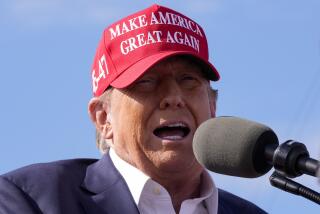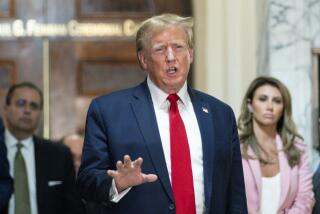Clinton Campaign Seeks Loan as Funds Run Low
- Share via
WASHINGTON — Gov. Bill Clinton’s presidential campaign, running short of its $55-million taxpayer-financed war chest in the final days of the election, has asked the Federal Election Commission for permission to borrow more money in anticipation of an expected reimbursement by the U.S. Secret Service.
Such a ruling would be unprecedented, and President Bush’s campaign on Thursday night denounced the request as evidence that the Clinton team had mismanaged public funds and was seeking an unfair late influx of cash to shore up its lead.
“The FEC should deny this panicked request for relief from profligate spending by the Clinton-Gore campaign and make Bill Clinton play by the rules,” Bush campaign manager Frederic V. Malek said at an evening news conference.
The Clinton campaign insisted it was faced with no more than a temporary cash-flow problem, and blamed its difficulties on inequities that force a challenger to pay upfront Secret Service costs that an incumbent never needs to bear.
“We’re not running out of money,” Clinton chief of staff Eli Segal said by telephone from the candidate’s Little Rock, Ark., headquarters. “We’re borrowing solely because we have not yet gotten our reimbursements.”
Under the rules, any presidential candidate who accepts the $55 million in federal campaign funds, which are generated through voluntary checkoffs on income tax returns, must abide by strict limitations on spending and fund raising in the general election.
Top Bush campaign officials said that the Clinton team had been aware of the regulations since the start of the campaign. A written statement issued by the Republican campaign accused the Clinton camp of “fiscal irresponsibility.”
“They’re broke,” Malek said. “They’ve run out of money. It’s an embarrassment.”
What is left in each campaign’s coffers is now of increasing importance, as all three major candidates plan this weekend to broadcast well in excess of $1 million in advertising to sway public opinion before voters go to the polls.
Both the Bush and Clinton camps have already taken noticeable steps to conserve funds for that final flurry, with the President’s party frequently taking refuge in inexpensive hotels while Clinton’s traveling band makes do with older buses and cheaper airplane food.
The Clinton campaign is negotiating to buy costly half-hour blocks of air time Monday on all three networks the evening before the election, a step that independent Ross Perot has also taken. An affirmative ruling by the FEC could make available additional funds that could be devoted to additional advertising.
With $7.9 million left in its own war chest, the Bush campaign sought to make the most of the Clinton cash-flow problems, with Malek accusing the Democrat of failing his “first test in managing federal funds.”
Some Bush aides acknowledged privately that the Clinton campaign had a point in its complaint that campaign finance regulations are skewed toward the incumbent. The Bush campaign, for example, has the use of Air Force One but need not reimburse the government for many expenses until after the election.
By contrast, the Clinton campaign must pay upfront costs for its two charter aircraft and await often belated reimbursement from the Secret Service agents and traveling press contingents who ride along as passengers.
But Stan Huckaby, the Bush campaign treasurer, noted that those regulations had been in existence since 1976.
Times staff writer David Lauter contributed to this story.
More to Read
Get the L.A. Times Politics newsletter
Deeply reported insights into legislation, politics and policy from Sacramento, Washington and beyond. In your inbox twice per week.
You may occasionally receive promotional content from the Los Angeles Times.










